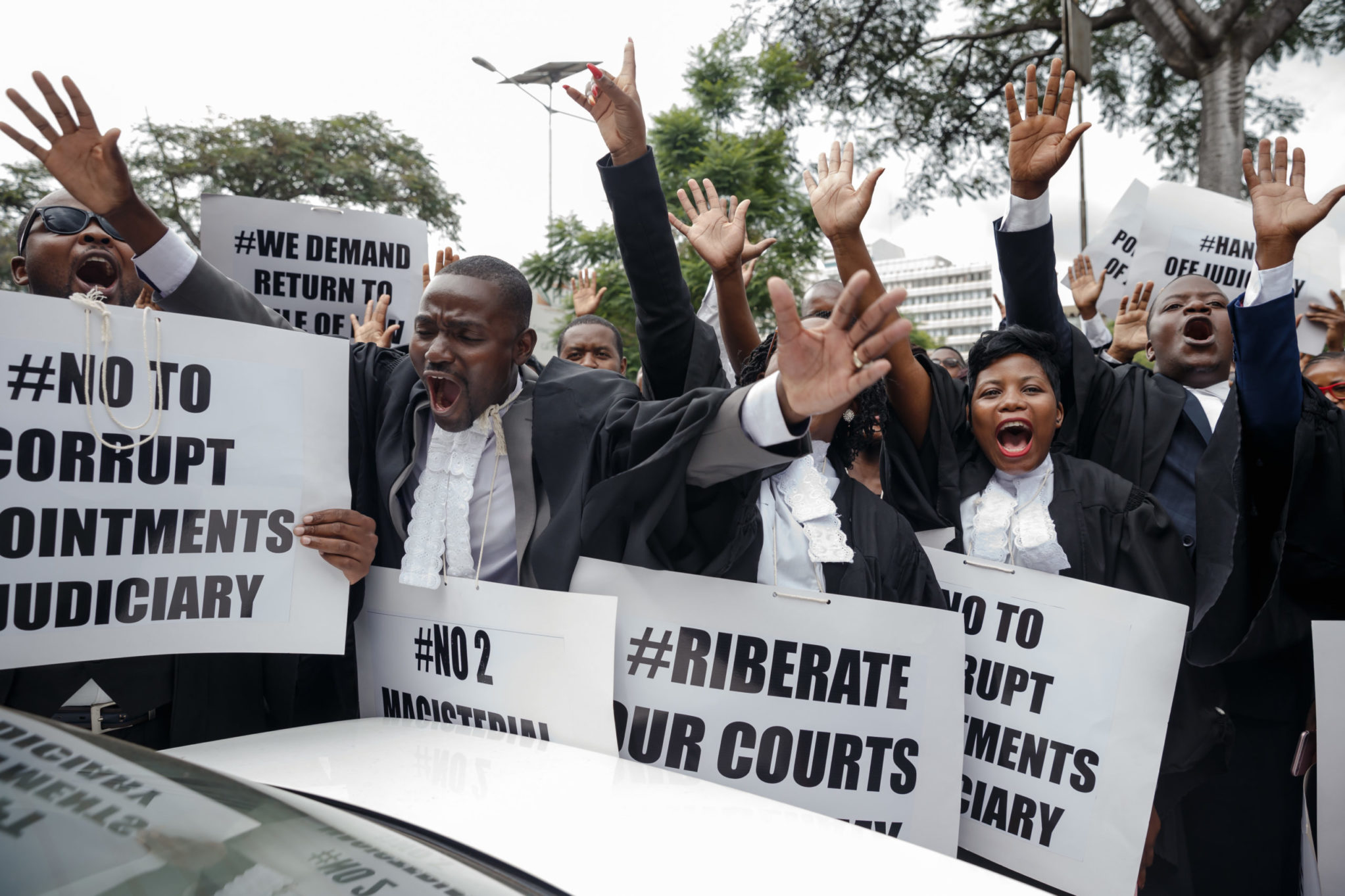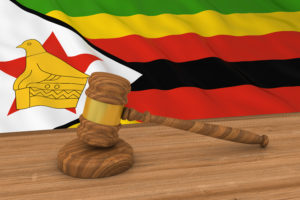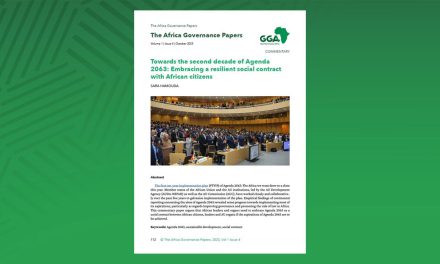If Zimbabwe is to be true to its democratic identity the courts and the rule of law are indispensable

Lawyers of the Law Society of Zimbabwe bar association take part in a “March for Justice” toward the Constitutional Court in Harare on January 29, 2019, to call for restoration of the rule of law, respect of human rights as well as the country’s Constitution.PHOTO by JEKESAI NJIKIZANA/AFP
Acts of commission or omission by the judiciary have consequences more far reaching than most may realise: Zimbabwe is currently using a currency (bond notes) whose promulgation was shrouded in legal mystery, never to be ventilated by the courts because the courts “passed the buck” when the opportunity came through.
We have a government in power through a court ruling, and we have almost a third of the country’s population resident in the diaspora disenfranchised because of a court ruling. Then we have the so-called aliens who voted in 2018 because the court overruled a long-held disenfranchising stance of the government.
Recently, a court ruled to declare the powers of the police to ban demonstrations unconstitutional and the same court has ruled, for the umpteenth time, to keep intact an unconstitutional law used to thwart criticism of the president.
Examples of far-reaching decisions are countless. What is intriguing is the reaction of the executive: when the courts rule against the executive the courts are often castigated, and when the courts rule in their favour praise is showered. Given Zimbabwe’s constitutional project, anchored on the new Constitution of Zimbabwe Amendment (No. 20) Act of 2013, it becomes imperative to ventilate the proper role of courts in a democracy.
The role of the courts is to police the political system, making sure the people and the political branches do not exercise powers beyond their constitutional quota. In the trias politica matrix of government, the judiciary is created as one of the three branches of government, responsible for interpreting and pronouncing on the law and on legality.
It provides a check on the other two branches and resolves disputes in the polity. In that sense, the judiciary is a partner in governance, whose role transcends rubberstamping executive or legislative decisions whether in mere deference or timidity.
Equally, the judiciary is too critical a component of any constitutional democracy for it to be party to performing democracy as opposed to doing democracy, when institutions and structures of the state are given a semblance of functionality and efficacy that actually betrays reality.
In many ways, as Alexander Hamilton argued, the judiciary is the least dangerous branch to the political rights of the Constitution, partly because courts stand – or should stand – above the political fray and act as a bulwark against tyranny.
The judiciary is designed with inherent structural independence and with binding and authoritative powers. This would continue to be the basis upon which to defend and protect courts.
However, courts have not always lived up to these standards. They have at times been manipulated and at times they themselves have voluntarily or unwittingly surrendered their authority by playing into the hands of the executive, in the process cutting back on constitutional promises or simply turning a blind eye to constitutional infraction. With an elected president and parliament, both of which purport to act for the people, tyranny is not too far. There, the judiciary becomes instrumental to prevent tyranny of the majority and exact constitutional compliance.
By design, the judicial branch is not elected. It is not there to represent sectarian interests but the compounded interests of society. These interests are the very principles upon which a civilised society is premised, among them equality, fairness, justice, rule of law and good governance.
These principles are anchored in the supremacy of the Constitution, hence the Constitution states in section 164(1) that “The courts are independent and are subject only to this Constitution and the law, which they must apply impartially, expeditiously and without fear, favour or prejudice”.
Section two of the Constitution sets the Constitution as supreme above all else: any law, practice, custom or conduct inconsistent with it is invalid to the extent of the inconsistency, and the obligations in the Constitution are binding to all, government and private.
In its work, the judiciary is beholden, and must show fidelity, to the Constitution and the law, the Constitution being the justiciable social contract entered into by the people as an expression of how they wish to be governed.
When the government abdicates its role the judiciary is the last line of defence. Thus judicial independence becomes a sine qua non for its vigilance and efficacy.
Hence the judiciary is created with inherent constitutional protective buffers such as non-interference by other branches of government (section 164); long tenures until retirement, or in the case of the Constitutional Court, expiration of the non-renewable 15-year term (section 186); protection against abolishment of a judicial position while an incumbent is in office (section 186); a rigorous removal and judicial discipline process (section 187); protection of the salaries of judges from diminution while in office (section 188); and immunity from prosecution and civil suits for judgments rendered.
But beyond that is individual independence. As a unit the judiciary ought to be independent, but individually judges must also wield independence, both from other judges and from anyone.
There is genuine cause for worry when judges in a court are in unanimous decisions in almost 100% of the cases coming before the court – an inconceivable and practically impossible feat to achieve save when judges are not exercising individual independence. Even in unanimity, there ought at least to be separate concurring opinions employing different reasoning at times.

The powers of the courts are constitutionally derived. The basic premise of separation of powers is that each branch should not act ultra vires, but should provide a check to other branches.
This is often the push-back line of the executive to the judiciary, accusing the judiciary of usurping executive powers when the judiciary nullifies executive conduct or a law. This argument is called the counter-majoritarian dilemma – which simply posits that the executive and the legislature are elected offices and an unelected office (the court) cannot undo the acts of the elected representatives of the people.
The reality is that the trias politica scheme anticipates the necessary or unavoidable intrusion of one branch on the terrain of another, as the South Africa Constitutional Court found in Ex Parte Chairperson of the Constitutional Assembly: In re: Certification of the Constitution of the Republic of South Africa, 1996 (4) SA 744 (CC).
The court rightly held that no constitutional scheme can reflect a complete separation of powers: the scheme is always one of partial separation. In Minister of Health and Others v Treatment Action Campaign and Others 2002 (5) SA 721 (CC) the same court addressed the argument that, owing to the separation of powers, the courts should show deference to decisions taken by the executive because policy is the prerogative of the executive and not the courts.
In the court’s words, all arms of government should be sensitive to and respect the separation of powers, but “[t]his does not mean, however, that courts cannot or should not make orders that have an impact on policy. […] Where state policy is challenged as inconsistent with the Constitution, courts have to consider whether in formulating and implementing such policy the state has given effect to its constitutional obligations.
If it should hold in any given case that the state has failed to do so, it is obliged by the Constitution to say so. In so far as that constitutes an intrusion into the domain of the executive, that is an intrusion mandated by the Constitution itself. […]” (My emphasis). As Stephen Humphreys notes, “[E]ven if the courts are not necessarily the best arbiters of social welfare policy, they remain the privileged centre of legitimacy under orthodox rule of law conditions, as the final arbiters of legal interpretation.”
Not only are courts in Zimbabwe empowered to declare that a right in the Bill of Rights has been infringed, they are granted powers in terms of section 85(1) of the Constitution to “grant appropriate relief, including a declaration of rights and an award for compensation”.
This is fortified by section 175(6)(b) of the Constitution, which states that “When deciding on a constitutional matter within its jurisdiction, a court may make any order that is just and equitable”. In short, the courts have wide powers to exact constitutional compliance and bind all who are subject to that Constitution in terms of section 164(3).
Mostly grounded in American constitutionalism, the counter-majoritarian dilemma is invoked by many politicians when they disagree with court rulings. It was invoked by Uhuru Kenyatta when the Kenyan Supreme Court annulled his presidential elections victory in September 2017, boldly asking, “Who elected you?” to the Supreme Court bench, and it has been raised by President Donald Trump in the United States.
Former president Robert Mugabe once said, “The judiciary has no constitutional rights whatsoever to give instructions to the president on any matter”, calling it “an outrageous and deliberate act of impudence”. Not only do these utterances miss the very essence of constitutional democracy, they are dangerous and reckless.
If the powers of the judiciary are constitutionally derived then there is no counter-majoritarian dilemma to speak of, for it is the people themselves who elected unto themselves a constitution with that very structure of judicial powers.
Constitutions by their very nature exist to cut back excesses and ill-advised urges of the people, even of the majority. The courts will always be there to remind the people of their commitments to themselves.
If the courts are no longer neutral arbiters of the law, if they are gradually shape-shifting into a partisan weapon, then it is perfectly reasonable to seek a re-organisation of the constitutional architecture the country has opted for itself, as Professor Mark Tushnet has argued. But as long as a constitutional democracy of our nature abides, the courts should remain independent, neutral and vicious defenders of the law.
If Zimbabwe is to be true to its democratic identity, the courts and the rule of law are indispensable. It is misguided to think of the rule of law as only having an impact on human rights.
That Zimbabwe is open for business cannot fly absent the realisation that capital is timid and the rule of law and independence and efficacy of the courts facilitate economic development.
As a critical instrument of governance the court should never become a blunt political instrument, used repeatedly to undermine the outcomes of democratic governance.
This requires attitudinal change on the part of the executive and the legislature, but equally the judiciary must realise that there is no national agenda to be served by undercutting its own constitutional authority and autonomy and shying away from making far-reaching pronouncements rooted in legal principle and necessity.
MUSA KIKA is completing a PhD in public law at the University of Cape Town as well as an LL.M. (specialisation in constitutional law, governance and human rights) from Harvard Law School. He graduated LL.B. summa cum laude from the University of KwaZulu-Natal in 2014. He is presently a legal officer (legal aid and research) for Justice for Children in Harare, Zimbabwe.









